I was catching up on some reading over the Christmas period trying to seek inspiration on how to improve productivity in my company and a number of interesting information was revealed.
 There are two famous quotes about productivity, both from Nobel prize winners. Paul Krugman, a US economist said “Productivity isn’t everything, but in the long run it’s almost everything” meaning output per worker is the ultimate driver of wealth and prosperity. The other comes from another US economist, Robert Solow who said “You can see the computer age everywhere, but in the productivity statistics” demonstrating the productivity paradox where huge progress had been made in information technology replacing much clerking and routine tasks, but had not had a big impact on productivity.
There are two famous quotes about productivity, both from Nobel prize winners. Paul Krugman, a US economist said “Productivity isn’t everything, but in the long run it’s almost everything” meaning output per worker is the ultimate driver of wealth and prosperity. The other comes from another US economist, Robert Solow who said “You can see the computer age everywhere, but in the productivity statistics” demonstrating the productivity paradox where huge progress had been made in information technology replacing much clerking and routine tasks, but had not had a big impact on productivity.
Both these statements ring true in the UK today. A weak economic recovery has been accompanied by a strong rise in employment and productivity growth has been very weak. Before the financial crisis, productivity grew between 2000 and 2007 at an average rate of 2.3% per year. At the end of 2012, UK output per worker was a mere 0.5% up on the average in 2009, the recession low point.
Why is this? Well different economists would provide different answers but, in my view, there are a number of plausible explanations. Firstly, many leaders may still feel relieved that they survived the recession and are right out of the challenge mentality, namely they are not up to further battles regarding staffing levels, equipment optimisation, problem solving and the constant need to lead change. Secondly, recessionary actions cancelled the training budget and managers and other staff have failed to gain new knowledge and competence to equip them to change and make things more productive and neither have they been involved in the motivational environment that training brings. Finally, external factors have given an advantage which has prevented the need to strive internally for more such as exchange rates favouring exporters; fewer competitors after recession, and a relatively low inflation economy which has kept costs down.
But change is on the horizon: the Government is considering pushing up the national minimum wage way ahead of inflation, competition will get stronger as businesses grow, exchange rates may well run against exporters, interest rates will rise and labour will become scarcer and more expensive. So make plans now if you want to stay in the productivity race.
Dr Hugh Billot, Deputy Chairman
HR GO Group of Recruitment Companies
HR GO Recruitment offers solutions to all your staffing needs, temporary and permanent, please call 0845 130 7000




Comments are closed.